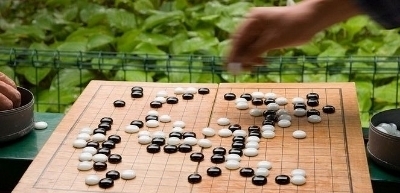The Game of Go in MissGO

The corporal no longer drives the governor general as the military has taken the automobile. So the governor general stays here. He and Mrs. Okata play Go in the 12-mat room. All day and much of the evening there is nothing but the click of the stones and the murmur of their voices.
Like chess, Go is a serious game. Two players use black or white stones and play on a board marked into a grid pattern. The click sound is produced by holding the stone near the tips of the first two fingers and then snapping the stone onto the board. That snap is a learned skill, rather like learning to use chopsticks, and pretty essential to the formality of the game.
Acquiring territory is the game's most obvious point. Stones are placed at the intersections of the grid, not on the blanks as in chess. One builds territory by placing stones adjacent to each other, by building chains of stones. The opponent then attempts to surround the other's chains with his or her stones. Once a chain or group of stones is surrounded by stones of the opposite color, the territory is taken and the surrounded stones removed from the board.
There are endless variations of the rules: Japanese, Chinese, American, etc. I've played a few times and was reminded of a childhood game I used to play with my brother: battleship. We spent endless hours deploying our imaginary fleets across handmade graphs on school binder paper, and blasting the hell out of each other's navies.
Yasunari Kawabata's The Master of Go, a fictionalized account of a famous 1938 game between an old master and a younger challenger, was published as a serial in the early 1950s. It is said to be his masterpiece. He was awarded in Nobel Prize in Literature in 1968. The novel was not published in English until 1972, the year Kawabata committed suicide.
At the forty-ninth day observations [the engineer] spoke of the governor general's accomplishments and of the days before the military arrived, a difficult but hopeful time for the early colonists. For someone of such few words, he talked at great length. He must miss the governor general and the time they spent together, often looking at maps together like boys playing some game, the islands like Go stones scattered across the blue. Pointing, discussing. Will the Americans come here, will they go there? And the Imperial Navy? Which island, which lagoon conceals our ships this week?
Rather astute of MissGO to compare the islands of the Pacific to chains of stones on a Go board. The U.S. Navy's successful plan during WWII was to move up the chain -- surrounding and capturing. Or skipping over the "high" islands like the one in Miss Gone-overseas, an island rimmed by mangrove swamps and not sandy beaches, making it unappealing to the usual assault tactics and the ease of landing crafts.
After the governor general's death, Mrs Okata is desperate for a playing partner, but MissGO does not measure up -- as Mrs Okata informs her -- the implication being that a country girl is not sophisticated enough. It is true that there is never a mention of high-brow cultural pursuits such as calligraphy or flower arranging or the tea ceremony, but the diary of this unsophisticated country girl is full of mono no aware. She fully embraces the impermanence of life.
And as for the game of Go, doesn't MissGO prove in the end that she is, in fact, a master of the game?
Published on August 03, 2013 13:13
No comments have been added yet.



